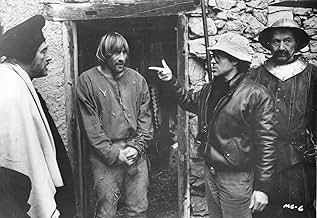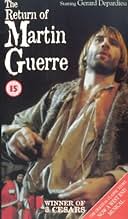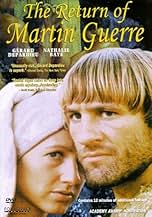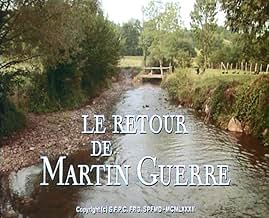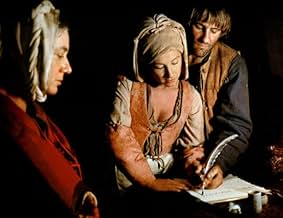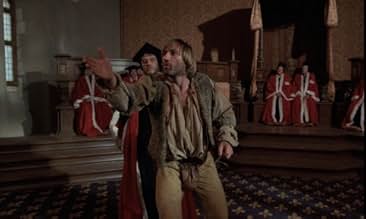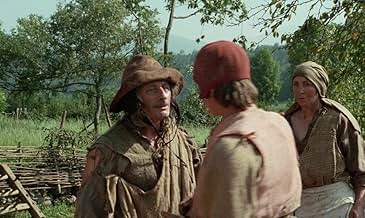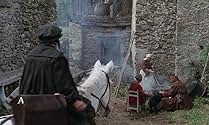IMDb RATING
7.4/10
5.1K
YOUR RATING
In medieval France, some villagers challenge a man's claim of identity when he (as he says) returns home from some time in the army.In medieval France, some villagers challenge a man's claim of identity when he (as he says) returns home from some time in the army.In medieval France, some villagers challenge a man's claim of identity when he (as he says) returns home from some time in the army.
- Nominated for 1 Oscar
- 6 wins & 5 nominations total
7.45.1K
1
2
3
4
5
6
7
8
9
10
Featured reviews
Great storytelling
This is the true story of a peasant in 16th century France who left his home village for almost a decade without saying a word to anyone, even his long suffering wife. When he comes home he's different; he's better. He's sweeter, more helpful, he smiles, hell - he laughs. Martin was never so good. Then comes the day a couple of drifters hit the village. They claim to know Martin but by a different name. That was the first chink in the armor. Things become so uncertain that he is finally put on trial to ascertain who this guy is. This is a loving microhistory intimately telling the story of life on a southern French farm after the wars of religion. It is superbly directed and acted, especially by the two leads, Gérard Depardieu and Nathalie Baye.
10johnnn
a history seen through a 'humane' binocular
I always enjoy watching French movies, and this one's no exception. In my opinion, this is a very beautiful movie. I love the romance, and the great performances enhance it to the maximum effect. This drama is very well made that you feel emotionally helpless on the mercy of the director. You get involved up to the point that you expect (want) things to work out like you want them to be but you really can't predict what's going to happen next.
The film tells about a true 16th century story about a man Martin Guerre who comes back to his village and family after an eight-years leave to a war. Everybody's really happy that he's come back that nobody questions the changes or differences after that long eight years; until someday a vagabond says that he's not Martin Guerre. The villagers start to think the possibility that he may not be the man he claims to be.
For me the film is about our judgment, our perception, our interpretation, our motive. It's about adding a human value to the rules, ethics, customs, and law that hold our society together. Sometimes what's right is wrong and what's wrong is right. In other words, sometimes we're looking for a 'humane' solution. You'll understand what I mean after you watch this movie.
The casting is wonderful, especially the casting of Nathalie Baye as Martin's wife. Something in her eyes perfectly reflects her character's sad life. She's beautiful. I imagine it's going to be very hard not to sympathize with her. Just watch this movie. I hope you'll be touched and enjoy it as much as I did.
The film tells about a true 16th century story about a man Martin Guerre who comes back to his village and family after an eight-years leave to a war. Everybody's really happy that he's come back that nobody questions the changes or differences after that long eight years; until someday a vagabond says that he's not Martin Guerre. The villagers start to think the possibility that he may not be the man he claims to be.
For me the film is about our judgment, our perception, our interpretation, our motive. It's about adding a human value to the rules, ethics, customs, and law that hold our society together. Sometimes what's right is wrong and what's wrong is right. In other words, sometimes we're looking for a 'humane' solution. You'll understand what I mean after you watch this movie.
The casting is wonderful, especially the casting of Nathalie Baye as Martin's wife. Something in her eyes perfectly reflects her character's sad life. She's beautiful. I imagine it's going to be very hard not to sympathize with her. Just watch this movie. I hope you'll be touched and enjoy it as much as I did.
When Gerard Depardieu Was Good
This is one of my most favorite movies of all time.
What makes this film so good? It is basically about this one universal truth, as said succinctly and poignantly by Bertrand, the wife of Martin Guerre: "As a woman, I have needs." Societies and civilisations that ignore this fact are the worse off for it.
Good acting, historical, and based on real events - these are some of the other positive aspects of the film.
What makes this film so good? It is basically about this one universal truth, as said succinctly and poignantly by Bertrand, the wife of Martin Guerre: "As a woman, I have needs." Societies and civilisations that ignore this fact are the worse off for it.
Good acting, historical, and based on real events - these are some of the other positive aspects of the film.
Quality is not USA's own
The one thing that THE RETURN OF MARTIN GUERRE serves to do is prove positively and absolutely that not all the great film productions come from the USA.
This is an extremely well made movie, with extremely high production values. Great acting, great sets, great costumes, great score. Pure quality.
This is an extremely well made movie, with extremely high production values. Great acting, great sets, great costumes, great score. Pure quality.
see in preference to Sommersby
This definitive version of the story of Martin Guerre (remade in English with Richard Gere and Jodie Foster as 'Sommersby'; and musicalised in a misguided version by Boublil and Schoenberg) is amongst French actor Gérard Depardieu's greatest roles. As the bluff, romantic, sensitive soldier who returns to the village after years away (or does he?) he manages to provoke all sorts of reactions from his other on-screen characters as well as the film's audience.
As Bernadette de Rols, the wife seeking love and companionship, Nathalie Baye is superb; while a large and talented cast give flesh to the remaining characters. I defy anyone to see this adaptation and not be moved by it; try and see in the cinema, where it undoubtedly has more power than on a small screen; and avoid the version dubbed into English. 'Le Retour de Martin Guerre' need to survive with its language and poetry intact.
As Bernadette de Rols, the wife seeking love and companionship, Nathalie Baye is superb; while a large and talented cast give flesh to the remaining characters. I defy anyone to see this adaptation and not be moved by it; try and see in the cinema, where it undoubtedly has more power than on a small screen; and avoid the version dubbed into English. 'Le Retour de Martin Guerre' need to survive with its language and poetry intact.
Did you know
- TriviaBased on a true story.
- ConnectionsFeatured in One Hundred and One Nights (1995)
Details
- Release date
- Country of origin
- Language
- Also known as
- Die Wiederkehr des Martin Guerre
- Filming locations
- Production companies
- See more company credits at IMDbPro
Box office
- Gross US & Canada
- $3,723,036
- Opening weekend US & Canada
- $8,682
- Jul 7, 2019
- Gross worldwide
- $3,723,036
Contribute to this page
Suggest an edit or add missing content


